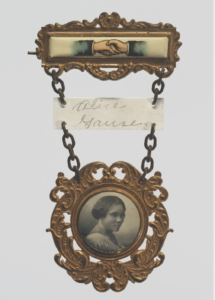It is essential that people have access to stable employment opportunities that pay a living wage, in order to build thriving communities in which everyone can afford to buy food, pay for housing, and care for their family’s other basic needs. Historically, Black people have been positioned at a disadvantage when it comes to accessing good jobs, due to legacies of racism and discrimination in employment, as well as the effects of systemic inequalities in education and job training. The Panthers initiated job training programs, collaborated with union organizers to advocate for workers’ rights, and organized boycotts of local businesses that did not give back to the community through fair wages, fair prices and more.

Name pin from a participant in a Madam CJ Walker training. (Collection of the Smithsonian National Museum of African American History and Culture, Gift of Dr. Patricia Heaston)
Among other things, the Panthers established a Community Learning Center, which offered GED programs, enrichment classes, and courses in home economics, consumer education and more. Their People’s Free Job Program gathered information from throughout the community and helped people understand what jobs were available and how to apply.
In so doing, the Panthers built on a long tradition of Black job training and entrepreneurial opportunities. Booker T. Washington founded the Tuskegee Institute to offer training for Black laborers, teachers, and a variety of other trades. Hair care and beauty industry entrepreneur Madam C.J. Walker ran training programs for Black women to become expert salespeople, in a time when few jobs outside of domestic work were available to Black women.


